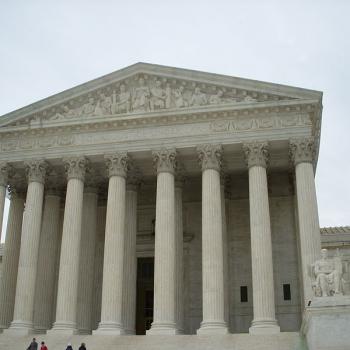The benediction at my Saturday Presbytery worship service jolted through me in a surprising and electrifying way.
It was surprising because that particular benediction is perhaps more familiar to me than any other. It was electrifying in its stark contrast to the benediction used at my current place of worship.
Go out into the world in peace; have courage; hold on to what is good; return to no one evil for evil; strengthen the fainthearted; support the weak, and help the suffering; honor all people; love and serve the Lord, rejoicing in the power of the Holy Spirit.
This was the benediction that we used on Saturday and it is the one included in the Presbyterian Church (USA)’s, Book of Common Worship as the “standard” benediction for Sunday worship. It is also the benediction that I grew up with my father saying every fourth Sunday at the conclusion of the service.
As a Christian educator and an ordained pastor, he preferred serving as an Associate Pastor so that he could focus on his calling as an educator. This meant that he normally preached only once a month. Even as we moved around and he served in different churches in different states throughout the South, the one thing that was constant and familiar were the words of his benediction. Even now, I can his voice echoing those words in my head when I recall this benediction.
I love benedictions anyway. They are, perhaps, one of the most misunderstood and misused parts of the Christian liturgy. In a tradition that is often focused on prayer – corporate and individual – people often mistake benedictions for prayers. But, they aren’t. A benediction is meant to be a blessing.
My dad always prefaced the benediction with these words, “Remembering that the benediction is not a prayer, but a blessing; and with your eyes forward, I say to you. . .”
He said these prefatory words every time he gave a benediction and they became as sacred as the benediction itself. Every time he preached, he not only blessed us as his congregation, but he reminded us what a blessing is and what it means to be a blessing to others.
In a world and a church where “blessing” is too often confused with the material things in our lives, a reminder about the theological significance of blessing is important.
This traditional benediction is a witness to the progressive spirit of Presbyterianism and Christianity more broadly. This benediction sends the congregation out into the world with very clear marching orders. As Martin Luther King, Jr. noted, 11:00 am on Sunday morning is the most segregated hour of the week. Most people worship in communities that reflect themselves – racially, economically, culturally. What are we to do when we leave our safe-knit, homogenous, community of faith? We are instructed in two important things – who we are to be and how we are to act in the world.
First – we are to go out into the world in peace; have courage; and to hold on to what is good. There is no ambiguity there about what it means to be a Christian. We are to be peaceful and brave and we are to hold on to what is good. These are the virtues or characteristics that should shape how we think about who we are in the world. Each of these instructions focus on our identity and how we think about the task of following Christ in the world.
But, this blessing does not stop with our individual character and development, it goes on. The second thing this benediction teaches us is how we are to act in relation to others – return to no one evil for evil; strengthen the fainthearted; support the weak, and help the suffering; honor all people.
If we take these words seriously, we quickly realize that being a Christian is no small task.
These words teach us that when we honor and respect the human dignity that is present in all people, when we recognize the imago Dei in each of God’s creations, it shapes how we act in the world. When human dignity is forefront, and we are acting out of peace and courage – we have the strength not to be petty, not to be mean to those who are mean to us. Even more importantly, this benediction teaches us that to be Christian we are called outside of ourselves and our comfort zone and into the world. We are called to reach out to those in need and to act.
This, for me, is the heart of what it means to be a Christian. The message this benediction taught me was that my faith called me to live differently, to act differently, to honor the dignity of all people and that in my very work of honor and serving others, I was loving and serving God. This was the power of progressive Christianity that taught me a faith beyond myself and a faith that inspired me to work for justice.
In my current congregation we use another very beautiful benediction.
Paul says, “The fruit of the spirit is love, joy, peace, patience, kindness, generosity, goodness, faithfulness, gentleness, and self-control. May we live by the Spirit.”
This congregation is also Presbyterian. It is solidly mainline, with just a hint of progressivism. It is a tall steeple church, and a wealthy church. Truth be told, it is more “liberal” than “progressive.” This benediction is more “liberal” than “progressive’ in much the same way.
The “fruits of the spirit” benediction is a virtue ethics benediction. It is focused on those individual qualities that liberals value and honor. The attention is focused squarely on the individual and how each of us should comport ourselves in the world. To be sure, these are noble qualities and if everyone embodied these “fruits of the spirit” then surely our world would be a different place. I have no quarrel with this benediction and the virtues that it is teaching my daughter or reminding me of on a weekly basis.
But, when we recited my familiar progressive benediction on Saturday, it reminded me of the power of the liturgy. It reminded me of the importance of what we say together as a worshipping community every week and how our theological commitments are shaped by our liturgical practices. It reminded me that while progressive Christianity is concerned about individual character and moral formation, it also recognizes that we are being formed for a very specific task – the task of justice in the world. It reminded me that we are called to a higher standard than simply loving our neighbor. Christians are called to seeking out those neighbors who most need our helping and loving, strengthening, supporting, and helping those in need.
It reminded me that progressive Christianity’s focus on our social responsibility is what is lacking in the liberal (and conservative) emphasis on individual virtue, sin, and salvation.
Go out into the world in peace; have courage; hold on to what is good; return to no one evil for evil; strengthen the fainthearted; support the weak, and help the suffering; honor all people; love and serve the Lord, rejoicing in the power of the Holy Spirit.
Amen













